Displaying items by tag: Peter Malone's Movie Reviews
Come-on, The
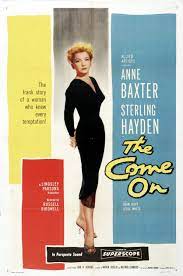
THE COME-ON
US, 1956, 83 minutes, Black-and-white.
Anne Baxter, Sterling Hayden, John Hoyt, Jesse White, Wally Cassell, Paul Picerni.
Directed by Russell Birdwell.
A femme fatale’s story, with a blonde Anne Baxter in the central role, reminding audiences of her Oscar-nominated performance as the insinuating actress in All About Eve.
This is a fairly routine story of seduction, invitation to murder, change of heart… The plot outline is substantial for this kind of film noir but the dialogue, the performances are not as strong and persuasive as they might be.
Anne Baxter emerges out of the water in a swimsuit, focusing audience attention, as well as that of a fishing captain played by Sterling Hayden. Instant rapport, suspicions, promises to meet again, her hurrying off, his discovering she has an alternate life…
In fact, she appears to be married to a sinister drunk, a very sinister John Hoyt, who is actually using her, has groomed her, to be seductive for wealthy men to fall in love and then be black males them. But, she does not receive the blackmail cash that she has been promised. And now, she is infatuated with the Captain.
He sells his boat, follows her, she urging him to kill her protector, her getting dynamite to the ship, but the captain not wanting to go through with the crime.
Within the 83 minutes, there are quite some complications, her admitting the truth, wanting to change her lifestyle, her wanting to get rid of her controller, the Captain selling his ship, following her, her trying to persuade him to kill the controller. Meanwhile, he knows what she is up to and has hired a private detective, Jesse White, who is not above the blackmail himself.
When the ship is blown up, not by the conspirators, we suspect that it might be a plot and the controller is still alive. He is, following the couple, intent on sabotaging the relationship, and a sequence of the final shootout on the boat, then, finally, on the beach where it all started.
Anne Baxter could be a strong screen presence but Sterling Hayden seems pretty stolid as a character and performance.
Good Grief
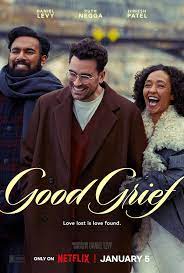
GOOD GRIEF
US, 2023, 100 minutes, Colour.
Daniel Levy, Ruth Negga, Himesh Patel, Luke Evans, Celia Imrie, Arnaud Valois, David Bradley, Mehdi Baki, Emily Corri, Kaitlyn Dever.
Directed by Daniel Levy.
A very personal film from Canadian writer-director, Daniel Levy. son of comedian Eugene Levy, he appeared with his father in the very successful television series, award-winning, Schitt Creek. He also appeared in the films, The Happiest Season and Haunted Mansion.
This is a film which wears its heart on its sleeve – really, on both sleeves. All the characters are highly emotional, act out in a dramatically emotional manner, the film inviting the audience to identify with the characters and their experiences, irrespective of gender and sexual orientation. For many, this will be easy to do, especially for audiences in their 30s who have shared something of these characters’ experiences. Some older audiences may find themselves rather impatient, wishing that the characters would move towards coming to terms with their experiences (with more rapidity and depth), even exasperated at some of the outbursts, especially in the central characters’ visit to Paris.
Daniel Leavy is a pleasant screen personality, has a way with words and emotions. He plays Marc a painter who has been in a long-term relationship, husband with writer, Oliver, played by Luke Evans. Luke Evans has to be a strong presence at the beginning of the film because he is soon involved in a fatal car accident, Marc’s memories and our impressions in order to appreciate Marc’s grief – and then the complications of revelations about relationships.
The other two in the trio are Thomas, played by Himesh Patel, a gallery manager who had previously been in a relationship with Marc. Then there is the mutual friend from long back, Sophie, Ruth Negga, an exuberant (sometimes wearyingly over-exuberant) would-be singer who wants to take control of her life, especially as she notes, at age 35. And we agree.
So, while good grief is a British expression of amazement, this American production, set in London and Paris with a British cast, is also a drama of how to handle deep grief, and then surprises, sad ones, in grief.
This is very much a 21st-century scenario, same-sex marriage, friends where orientation is not an issue. The audience is invited to identify with them in their emotions, in their grief and, with some relief, some sensible practical advice from British character actors, Celia Imrie is a financial manager and David Bradley as the dead man’s father, a significant speech that he makes at his son’s funeral, being a sometimes barrier to his son’s hopes and ambitions.
- The title, the popular expression? A film about grief, not necessarily good, very sad, and grief at betrayal, understanding and forgiveness?
- The work of Daniel Levy, writing, performing, directing? His sense of characters, dialogue, touches of wit and humour?
- These are popular songs throughout, Neil Young, Elton John… And the significance of the lyrics, characters and themes?
- The opening, introduction to Oliver, to Marc, the celebration, the chat, the revelation of the relationship, songs, speeches, Oliver packing, the farewell? The taxi, the sound of the crash, Marc running to the crash, grief? The Christmas gift and his not opening it for a year?
- Marc, the past relationship with Thomas, the continued friendship, Marc and his paintings, giving up after his mother’s death, regrets at his not supporting her, illustrating Oliver’s work? Thomas urging him to paint? Sophie, friend from a long time, exuberant, over-exuberant, demanding on people, her relationship with Terrance, ups and downs, saying that she left him, the final revelation that he left her, her explanation of the reasons, her sinking low, sleeping at the bus stop, realisations, reuniting?
- Memories of Oliver, his funeral, the presence of his, father’s speech, impeding his son’s storytelling, his pride, his regrets? The actress, her self-focused video speech, about all this writing, her career, the series of films?
- Financial situation, the adviser and her care for Marc, selling of the house, the financial arrangements, the discovery of the apartment in Paris, the effect on Marc? The months passing, the consolation from Thomas and Sophie?
- The decision to go to Paris, inviting his friends, the exuberance of tours of the city, the discovery of the apartment, lavish, Marc not revealing the truth? Their outings, Sophie and Sebastian and friend, the young man and his approach to Thomas?
- Returning of the Christmas gift to the store, the discussions, concessions, Thomas and Sophie and their spending on clothes?
- Marc, the encounter with Theo, exchanging numbers, Marc feeling lonely, contacting Theo, his coming, their walk, being honest, Theo dissatisfied with his job but liking the money, not wanting to lie, Marc and his revelation about his mother, about Oliver, about the betrayal? The going to the Monet exhibition, Monet and his sense of loss, losing his sight, the vast paintings, Theo encouraging Marc?
- The return, Thomas upset and feeling hard done by, Sophie and her collapse, drinking, at the bus station, the police, Thomas having to rescue her, the condemning Marc for his insensitivity?
- The arrival of the dancer, the key, the surprise to everyone, the revelation of the truth? His asking to stay the night? Sophie and the bad cooking, their toasting loneliness, his staying?
- Thomas and Sophie upset, the returning to England? Marc returning, the explanation from the dancer?
- The sequence of Sophie coming to her senses, speaking the truth about herself, the reconciliation with Terrance, her future?
- The good advice from Imelda, her own experience, grief, new life, memories and regrets?
- Marc, the house for sale, seeing Oliver at the door, the house and the sea, painting the picture of Oliver, the transition to the exhibition, the portrait of all his friends, their arriving, reconciliations, Sophie with Terrance, Oliver’s father, and Marc finding some peace and a future life?
Tre Piani/ Three Floors

TRE PIANI/ THREE FLOORS
Italy, 2021, 119 minutes, Colour.
Riccardo Scarmarcio, Eleanor Lietti, Alba Rohrwacher, Adriano Giannini, Margharita Buy, Nanni Moretti, Denise Tantucci, Alessandro Sperduti, Anna Bonaiuto, Polo Graziosi, Stefano dionisis, Teco Celio.
Directed by Nanni Moretti.
Nanni Moretti is one of Italy’s best known and best loved writers and directors. He is a popular favourite, a festival favourite, winning in Cannes in 2002 with his very moving film, The Son’s Room.
Usually Moretti write his own screenplays but here he has adapted an Israeli novel, transferring the action from Jerusalem to Rome.
As with the title, we expect different stories from the different levels of the three floors of the apartment building. While each has a distinctive and dramatic story, there are the linkings.
The initial story focuses on a family, a creative husband, played by Riccardo Scarmacio, a businesslike wife, the young daughter. Both busy, they entrust their young daughter to the neighbours, an elderly man and his wife, the old man suffering from some dementia, but the crisis coming when the little girl goes out with the old man for ice cream and they get lost in the park, he collapsing. The father then becomes obsessed that the old man has assaulted his daughter, coming to hospital and threatening him, totally absorbed and possessed. However, a dramatic turn of events when the granddaughter of the old man comes from Paris, flirts with the husband, is seductive and he succumbs.
In the meantime, there is a young pregnant woman, her husband away, her wanting to get to hospital, almost knocked over by a runaway car, a drunken driver who knocks over the pedestrian and kills her, crashing into the workplace of the initial family. The driver is the son of two prestigious judges who also live in the building, the father, played by Nanni Moretti himself with veteran Margarita Buy as his wife, is stone, unforgiving of his son who brutalises him. The pregnant young woman’s husband is away for work, returning periodically.
The reckless driver, callous and excusing himself, goes to trial, found guilty, imprisoned.
Five years pass.
The driver is to be released from prison, refusing contact with his mother, disappearing. The couple are bringing up their young baby but the mother, often intense because of her husband’s absence, dramatic trouble because of her husband’s fraud dealing brother who comes to stay at the house, but visiting her mother and fearing that she might have mental troubles like her mother.
In the meantime, the husband has been taken to court, prosecuted by the young woman but is found not guilty.
Another five years pass.
The audience has got to know the characters quite well. The daughter has grown up and is good friends with the young woman with whom her father had the relationship. On the other, the initial pregnant mother is pregnant again, but with her husband, but suffering from the mental disturbance that she feared. With the two judges, he dies and his wife gives their goods to charity – and the manager of the charity takes her to see her son, his new life. She goes to the husband of the victim that her son killed trying to make amends and discovers something more positive about her son.
Each of the episodes could have been a film in itself. But, this is an involving Italian drama, complex, raising many social and dramatic issues.
- The work and career of Nanni Moretti, human and humanistic themes? His original screenplays? Awards? An adaptation here of an Israeli novel, transfer from Israel to Italy?
- The title, the building, the interiors, stairs and corridors, apartments and interiors? The outside of the building? The street?
- The different stories, the families, independence, interconnections? The structure of the film, moving from one story to the other?
- The husband and wife, judges, professionals, the raising of their son, his drinking, driving recklessly, missing the pregnant Monica, running down the old lady, crashing into the basement? His arrest? At home with his parents, his resentments, their high demands, his professional father, expectations, disappointments, the son’s reaction, hitting his father, viciously kicking him? Ousted? His relationship with his mother, having to sake the side of her husband against her son? His angers, character, age, justified resentment, drinking, home arrest, leaving, the trial, his wanting favours from his parents for the trial, sentenced, in jail, not wanting his mother to visit, five years in jail?
- Monica, on the road, alone, pregnant, looking for a taxi, desperate, the accident, in hospital, the birth, the difficulties, the baby, going home, bonding with the child? Her relationship with her husband, his being away for work, the phone calls? Her loneliness? Her fears about caring for the child? The encounter with the judge, her coming into the house, helping Monica with the baby? The husband returning home? The gift of the pram from his brother, his anger at his brother, condemnations? Taking the pram back, confronting his brother? The comment about Monica nicknamed the widow?
- Lucio and Sara, their marriage, personalities, love for their daughter, their professional life, leaving their daughter with Renato, his age, touches of senility, playing games with Francesca, her writing his back, the reaction of the parents? The support of his wife? The accident and the crash into the basement? Lucio tense? Sara and her professional work? The need to entrust Francesca to Renato despite themselves? The return, their missing, Lucio and his anger, eruption, over the top, suspicions, the contrast with Sara? The search in the park, finding them, Francesca’s story, her idea for the war, the ice cream, Renato’s collapse? The position? Lucio and his accusations?
- Renato in the hospital, the reaction of his wife, Lucio coming to the hospital, violent threats? Continue to suspicions? Francesca, at school, lonely, Lucio watching through the window, fostering his suspicions? The contrast with his wife and her commonsense?
- Charlotte, coming from Paris, concern about her grandfather, the visits to hospital, coming to the apartment, the car, flirting with Lucio, her talk sounding permissive, her approach to him, his resistance, succumbing, the encounter, her lying, the loss of her virginity? His leaving? His being taken to court?
- Five years passing, the changes, Monica and her relationship with her husband, pregnant again, giving birth? The visit to her mother, her mother’s mental health, her own fears? With Beatrice? The exposure of the brother, his swindles, coming to stay, his approach to Monica, playing with Beatrice, the secret, Monica telling the truth to her husband, his reaction, confrontation?
- Lucio, the relationship with Sara, the truth, moving out, with Francesca? Her not knowing the truth? In court, the testimonies, Sara supporting him? Charlotte and her presence in court, the accusations, the jury, the decision, her wanting to appeal?
- The judges, their son getting out of prison, rejecting his mother, his disappearance? The death of the judge?
- Five more years passing? Lucio Lucio, calmer, his wife, his daughter, Charlotte returning, their being friends, Charlotte and the truth? The effect on his life? And is over anxiety about Renato and Francesca?
- Monica, wandering away, the children, her husband, her phone call, like her mother, mental condition, institution? The father with his two children?
- The judge, widow, her decisions about her husband and son, giving away the clothes and possessions, the head of the charity, recognising her, his request, travelling by car, wary, her son, married to the man’s daughter, keeping the bees, his mother going to see him, the continued rejection? The suggestion that he apologise to the man whose wife was killed?
- The judge, the new dress, change of lifestyle, leaving the apartment, her memories? Going to see the widower, apologising on behalf of her son, the revelation that her son was sending jars of honey as some kind of atonement? Her future, possible reconciliation with her son?
- A cross-section of Roman life, families, themes of mothers, themes of fathers and daughters, sexuality, sexual encounters, violence? Possibilities for forgiveness and reconciliation?
David Holmes, the Boy who Lived
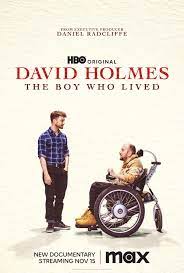
DAVID HOLMES: THE BOY WHO LIVED
UK, 2023, 90 minutes, Colour.
David Holmes, Daniel Radcliffe, Marc Mailey, Greg Powell, Tommy Wells, Sue Holmes, Andy Holmes, Tolga Kenan.
Directed by Dan Hartley.
The Harry Potter franchise was an extraordinary milestone in popular cinema, based on JK Rawlings popular novels, the films being produced over a ten-year period in the to thousands, seen by vast audiences, promoted, and continually repeated on streaming services as well is stage adaptations.
This is the story of a young man who was Daniel Radcliffe’s stunt double, David Holmes.
The Holmes family had a great deal of home video, a vital source of visual information about David, his athletic prowess, gymnastic expertise, from a young age. The connection with stunt producer, Greg Powell, led him to the Harry Potter franchise, just a few years older than Daniel Radcliffe, but sufficiently resembling him to be a stunt double.
There is quite some visual exhilaration in the gymnastic portrait of David Holmes, and the detail of his work and the stunts for the Harry Potter films. And, David is an enthusiast, finding his life’s vocation in stunt work. Then, one day, an accident which broke David’s neck, rendering him paraplegic, a long time in hospital, recuperation, rehabilitation, confined to a wheelchair, limited power in his right arm, deteriorating, his life, his date disabled life, for more than a decade.
David Holmes is, still, a cheerful personality, immediately aware of what had happened to him, participating in the surgery, as well is surgery on several operations 13 years later. There are interviews with his parents, his upset mother talking about suing, and David Holmes replying that his wife was reportedly did not want to ruin anyone else’s life. This perspective on life has continued.
David became friends with Daniel Radcliffe, a kind of older brother situation as he trained the actor who was not particularly well coordinated for the stunt work. They got to know each other well. And, over the years, Daniel Radcliffe has been a good friend to David, and, while living in New York, always visiting David on trips to England, one sequence showing him going to a program where David is training young gymnasts.
David’s good friend Mark Mailley from raucous days but then becoming a successful stuntman, is interviewed for this film, often almost moved to tears. It is the same with Greg Powell who feel some sense of responsibility for David state because he introduced him to start work. The film is also a great tribute to Tommy Wells, David’s long time, patient and devoted carer.
Fans of Harry Potter, this will be an insight into the making, the tragedy of accidents, and an admiration of the longtime friendship between David Holmes and Daniel Radcliffe. It is also a film about profound disability, the reality of surgery and hospital care, recuperation and rehabilitation. But, given David Holmes temperament, optimistic view of life, this is also a moving documentary about the courage of the human spirit.
Nekrotronic
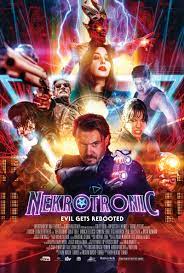
NEKROTRONIC
Australia, 2018, 99 minutes, Colour.
Ben O'Toole, Monica Bellucci, Caroline Ford, Tess Haubrich, Epine Bob Saviea, David Wenham.
Directed by Kiah Roache-Turner.
Certainly one for the fans – the average audience tuning in might be bewildered, and even more bewildered. Probably best to quote an enthusiast to give an indication – Bloody, Cheesy, Fun : Krush_Burner25 July 2019 The most important thing one should know about this film is: "Nekrotronic" is a truly guilty pleasure for anyone who's into gunfirghts, gore and flat jokes.
This film was written by two brothers, Kayak Roache-Turner and Tristan Roache-Turner. That made a number of short films but achieved some fame and notoriety with their horror film, Wyrmwood. After this film they made a sequel, Wyrmwood Apocalypse.
While the film opens in a very mundane situation, two workers on a plant, one very ordinary (Ben O’Toole), the other continually on his phone, eagerly pursuing horror and ghosts themes, and some corny humour throughout the film, especially when he himself becomes a ghost, played by Epine Bob Savea. So far, so corny.
But then the graphic novel themes and visuals set in, the opening up of a weird plot, evil influences, diabolical (initially shown with entertaining animation) invade the world, especially through social media, intending a complete takeover. The hapless worker suddenly discovers that he is not ordinary, that he is discarded son of the archvillain, of all people, Monica Bellucci, destined to confront her with a number of daemon-busting allies.
In one way or the plot is very complex, try to work out who is who. On the other hand, it is straightforward, good versus evil. And, lots of graphics, special effects, stunt work, and fights galore (punctuated with that ghostly humour).
While the hero seems somewhat nerdish, he continues to rise even further to the situation, having to make a decision between his mother and opposing her. And, in several female warrior allies. There are ghosts, ordinary citizens being drained of their energies…
And, there is David Wenham is one of the initial fighters.
If this kind of film has to be made, and the bloggers are highly enthusiastic, then the Roache-Turner brothers who wrote the film, produced it, and Kiah Roache Turner directing, are the ones to make it.
Boys in the Boat, The
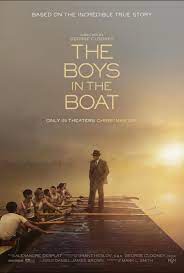
THE BOYS IN THE BOAT
US, 2023, 123 minutes, Colour.
Joel Edgerton, Callum Turner, Peter Guinness, Sam Strike, Hadley Robinson.
Directed by George Clooney.
An enjoyable film, based on actual characters and events, a sports film, a film of training, competitiveness, achievement, better aspects of the human spirit.
And, behind the camera is George Clooney, who has directed quite a number of successful films, who has star power, and who is involved very much in human rights issues.
This is 1936, Washington state, University of Seattle. But, the US is still suffering the consequences of the Depression, lack of job opportunities, makeshift townships, hunger, low self-esteem… In this context, we are introduced to a young man, Joe Rantz (British actor, Callum Turner), whose mother has died, whose father has abandoned him when he was 14, trying to manage to get casual work, living in a makeshift Depression town, but also trying to study at the University, engineering. A friend mentions to him that the coach of the University rowing team is looking for oarsmen. Joe feels there could be some financial advantage and goes to audition, to participate in the extraordinarily rigorous training and exercise, and eventually chosen as one of the team eight.
While there is some personal story for Joe, a sad encounter with his father, friendship with a fellow student, Joyce (Hadley Robinson), he becomes more and more committed to the training, his role in the eight, and the buildup to a competitive race.
The rowing coach is played by Joel Edgerton, now something of a senior citizen in his roles, stern, plainspoken, rarely smiling, a former rower, but skilled in techniques, in the demands on his men, evaluating their positions in the boat, the screenplay explaining for viewers the role of each man, but, especially the role of the Cox, his overview, his ability to engage the progress of competing boats, and, in this case, a cheeky interpretation of regulations and encouragement of the rowers.
A significant character is George, the boatbuilder, played by British Peter Guinness, who becomes a father-figure and guiding hand in Joe’s character development and sports skill.
We know that the Washington team is going to succeed locally, then in the American final, and be selected for the competition at the Berlin Olympics. There are complications when the rowing establishment tells Washington that there is not enough money to send the team to Berlin. What follows is a week of appeals and donations, and a glimpse of Joe’s father donating as Well Is listening to the radio race commentary, generous gesture from a rival that enables them to go to Berlin.
There is mention earlier of Jesse Owens. And, as the American team waits to march into the arena, there is a brief conversation with Jesse Owens who tells his white fellow-athletes, that he is trying to achieve for his people back home. And, perhaps we remember that Hitler was not impressed. And, there is a scene where Hitler comes to watch the rowing, a literal photo finish between three boats, and his leaving in a huff when the American victory is announced.
We might say that the film is formulaic as a sports film with final achievement. But, with George Clooney’s sensibility and the talent in front of and behind the camera, why not? And, it is definitely a feel-good film.
- True story? Audience awareness or not?
- The Olympics in Berlin, the atmosphere of the 1930s, Hitler, Nazism? The Olympic Games, the US not saluting? The presence of Jesse Owens?
- The sports film, using the formula, memories, the participants, the coach, the rowers? The choices, the strict and hard training, personal ups and downs, the achievement?
- 1936, Seattle, the University of Washington, the late for the rolling, the sequence at Poughkeepsie? Berlin, the Nazi buildings, flags, the stadium, the games? The musical score?
- The framework, the grandfather, watching his son, peeling the apple, memories, the grandson getting lost, helping? The heritage?
- The focus on Joe Rantz, his background story, his mother’s death, father leaving, age 14, the Depression, lack of jobs, the Depression village and its poverty, hunger and lining up for food, no money, the hole in his booted newspaper, his studying engineering, the lectures, friendship with Roger, the attraction to Joyce, his quality of life, motivation, to raise money, sense of rejection and quitting?
- The coach, not smiling, relationship with his wife, past roller, his abilities, auditioning the men, Joe asking about the payment? The strict coaching, plainspoken, the work with the other coaches, the other authorities, the possibility for going to Berlin, the hostile attitudes, the issue of raising money?
- The collage of training sequences, close-ups, hard, exercises, rowing? The coach advising there was no shame in not being selected, because of the effort? The selection, the nature of the teams, the different places and tasks, the dormitories, the better clothes for those chosen?
- Joe seeing his father, their talk, his anger, the father’s explanation, leaving? The father listening on the radio to the races, giving the donation and Joyce seeing him?
- The buildup to the race, the rivals, practices, the crowds, the train going past the rowers? Everybody watching? The effort, the strategy, winning?
- The joy and exhilaration, the teams, the coaches?
- Going to Poughkeepsie, the rivalry, the tactics, the Cox? Winning, going to Berlin, the issue of finance the appeal, the collection of money, the donations, the final gesture from the growing coach?
- Joyce, her friends, studying, the attraction to Joe, time together, the socials, in the dormitory, at the station, the brusque farewell, his return to kiss her?
- Berlin, the joy, the pomp, the games, the character of Dan, always silent, yet playing the piano? His illness, the treatment? In the preliminary? His effort, the Cox urging him on?
- The character of the Cox, cocky, cheeky, the trust of the coach, his skills, decisions, defying the coach, singing the song to encourage Dan?
- Hitler, his presence at the games, his walking out as the Americans won?
- A sports film, a film of achievement, American sports history?
Murder is Announced, A/ 1985
A MURDER IS ANNOUNCED
UK, 1985, 153 minutes, Colour.
Joan Hickson, Ursula Howells, John Castle, Renée Asherson, Nicola King, Simon Shepherd, Elaine Ives-Cameron, Ralph Michael, Sylvia Sims, Matthew Solon, Mary Kerridge, Joan Sims, Paola Dionisotti, Kevin Whately.
Directed by David Giles.
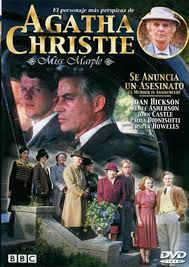 This is the Joan Hickson version of Agatha Christie’s 1950 novel. For many, Joan Hickson is the best embodiment of Miss Marple, very much as Agatha Christie created her.
This is the Joan Hickson version of Agatha Christie’s 1950 novel. For many, Joan Hickson is the best embodiment of Miss Marple, very much as Agatha Christie created her.
This film opens dramatically with the newspaper announcement of a murder to be committed at 7 o’clock at a particular house, a range of people reading the announcement, curious, ensuring that they will be present. The owner of the house, Miss Blacklock, takes a rather detached attitude.
Guests gather at the house at 7 o’clock. The lights go out. An intruder threatens people, there are shots, Miss Blacklock is wounded in her ear, the intruder is shot dead.
As anticipated, so much of the film is interrogations by the rather stern-faced but often kindly detective, played by John Castle. His assistant is played by Kevin Whately, almost like an audition for Morse.
There are many suspects, different clues around the village as with the local military man from India and his ambitious wife and the disappearance of his revolver. There is the unravelling of the identity of the intruder, his Swiss background, conniving for money, relationship with the local waitress.
One of the strengths of the versions of Agatha Christie novels is the strong British supporting cast with veterans like Renée Asherson, Joan Sims and a strong performance by Ursula Howells, holding the film together, as Miss Blacklock.
As some of the people in the village start to investigate, there are further murders, even to Miss Blacklock’s close friend and companion, played by Renée Asherson.
A complex back story emerges, international bankers, marriages, reappearing in-laws, Miss Blacklock’s ailing sister.
For most audiences, the revelation of the truth will be quite a surprise!
- The popularity of Agatha Christie novels, with Joan Hickson as Miss Marple?
- The atmosphere of the 1940s, the look, the lifestyle, customs and presuppositions, costumes and decor, the postwar period?
- The title, the opening, the announcement of the murder, and the papers, Miss Blacklock and the venue for the murder, the gossip in the town, the introduction to the variety of characters, the preparation for the occasion, in the house, buying the sherry, the preparations?
- 7 o’clock, the lights out, the shooting, the torch, Miss Blacklock, cut to the ear, the Swiss man’s death? His background story, the thief, asking for money, the relationship with the maid? The revelation that he did all this for a lark, for the money?
- Inspector Craddock, serious, his range of interrogations, present, shrewd, the conversations with Miss Marple, change of perspective, his manner of treating each of the suspects?
- The Colonel, pompous, India, his wife and her style, the issue of the missing gun?
- Hinchcliff and Murgatroyd, companions, Hinchcliffe and the war experience, their presence, conversations, trying to find out who did it, Hinchcliffe and the solution of where the record was? Murgatroyd realising who was absent? Hinchciffe driving off, Murgatroyd being murdered?
- Bunny, attractive character, a companion to Miss Blacklock, dithery, the story of the past, the trust in Letty, the conversations with Miss Marple, with Inspector Craddock? The death?
- The back story about Letty Blacklock, secretary to the financier, his wife, his sister and children, the mystery of Pip and Emma? Inspector Craddock going to visit the millionaire’s wife in Scotland? The identity of Pip and Emma? The widow, her husband in war, deception, her son, boarding with Miss Blacklock? The revelation? Julia, posing as the cousin, Patrick, Patrick an actual cousin? Their motivations to go to Miss Blacklock, support?
- The vicar, his wife, Miss Marple staying with them?
- Julia and Patrick, it and the house, modern, their attitudes, with Miss Blacklock?
- Edmond, writing the novel, Communist, his mother and her fuzziness? Edmond and his attraction to Philippa, the visits, the conversations?
- The range of suspects, the various clues?
- Hannah, refugee, better, the cook? The revelation about the witness – and Miss Blacklock attempting to kill her?
- The final focus on the woman as being the killer, the issue of the separate doors, the moving the desk, the oiled lock, the torch, the shops, the gun on the floor? The focus on a woman?
- The final visit, Miss Blacklock attacking Hannah, the revelation of the truth, the setup?
- The credibility of the situation, Miss Blacklock and her sister, taking her place, the money issues?
Night Swim
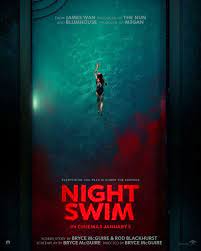
NIGHT SWIM
US, 2023, 98 minutes, Colour.
Wyatt Russell, Kerry Condon,
Directed by Bryce McGuire.
In more recent times, there have been a number of “horror films” which are more widely accessible to a drama friendly audience. There are not horror films in the sense of blood and gore, the type of horror films popular at horror festivals. Rather, the new films are films of menace, haunting, often with what might be called PG characters. They can play well to a more family oriented audience but are denounced as to tame by the gore aficionados.
We are introduced to the touch of menace immediately, a little girl with her invalid brother, a toy floating in their pool, her deciding to retrieve it, but her then being dragged into the pool and disappearing.
What follows is, in many ways, the kind of plot we might have anticipated. A family, the father a baseball champion but debilitated and recuperating, a supportive mother who works in school administration, an older daughter, a younger son, deciding to settle down and buy a house. Of course, they are attracted by the house and the pool. So, we really know what is going to happen but the tantalising aspect of the film is how it will happen.
Audiences will be attracted by this pleasantly average American family, the father played by Wyatt Russell and the mother played by the Irish actress, Kerry Condon (Banshees of Innisfail). There are scenes with the doctor and hope of recuperation, there are scenes of swimming and the father getting better, there is exaltation in having the pool.
However, the daughter senses presence of others but no one there. The son enjoys a game of retrieving coins, but no one there. The mother senses eerie presences, but no one there. But, we know who’s there!
There is a happy sequence where the father takes his son to a baseball practice, the mother encouraging the somewhat timid son to hit the ball – and he does. But, the crowd persuades the father to demonstrate his past progress and he certainly smashes the ball. Happiness all round.
l
So, what better than to have a party, to invite everyone from the school, the neighbours, a welcoming party. But, of course, the haunting strikes, everyone afraid, leaving, denouncing the family.
There are some complications, of course, the mother seeking out the owner of the previous house to get the story and learning of a strange mythology of the powers of water, the healing power but there always demanding a human sacrifice, giving up the weakest member of the family. Which leads them to a dramatic underwater climax, family confrontation – some saved, and a sacrifice made the sake of others.
- Drama, touches of menace and horror? Wanting? Powers evil? But a family story?
- The formula, Rebecca and the haunted house, the drowning? The empty house, sale, suppression of the truth? The buying of the house? Manifestations of evil, manifestations of healing?
- The American family, middle American, the baseball background, reputation, loving father, loving wife, son and daughter, the wife of the school in administration, husband and his therapy? The stories about the birth of the children? The moves, wanting to set down roots, the house, the attraction of the pool?
- The father, interviews with the doctor, diagnosis, therapy, improvement? The wife, work at the school, her bonding with the children, support of her husband?
- Elliott, in the pool, the issue of the coins, no one present? The sound on the diving board? The presence of Rebecca, Elliot putting his hand in the entry, voice, his fears? Isabelle, in the water, a sense of presence, absence? The same with the wife? The husband in the pool, the relationships, the effects, the atmosphere?
- The baseball episode, his mother encouraging Elliot, hitting the ball, the father and the enormous it, the ball, the souvenir the autograph?
- Isabelle, friendship with Ronin, the pool, the visit at night, the eerie experiences?
- The party, the friends and children arriving, the happiness, the mother’s discussion with the estate agent, the revelation of the Rebecca story?
- The boy with the autograph, on the father’s shoulders, confronting the big man, the pressure, the boy almost drowning, the father, the blackness in the pool, absorbing it? The hostile reactions of the families?
- The father, his physical health improving? Yet the aftermath of the incident, his being paralysed? Driving the car? The mother, seeking out the Japanese mother, the interview, the mythology of the lake, the power, healing but wanting a sacrifice? The son becoming wealthy? Rebecca expendable?
- The buildup to the finale, the sacrifice of Elliot, being weak, in the pool, the father, Isabelle with the bat? Elliot, under the counter, his mother diving in to save him? Isabella, the haunting, saving Elliot, getting a baseball bat, confronting their father, the mother, Rebecca helping, the final confrontation? Elliot the weakest? The father and his self-sacrifice?
- A haunting story rather gory? And a PG story?
Boy and the Heron, The
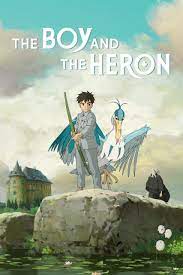
THE BOY AND THE HERON
Japan, 2023, 127 minutes, Colour.
Japanese voice cast. English-language voice cast: Luka Padovan, Robert Pattinson, Gemma Chan, Christian Bale, Mark Hamill, Florence Pugh, Willem Dafoe, Dave Bautista, Denise Pickering, Mamoudou Athie, Tony Revelorii, Dan Stevens.
Directed by Harao Myazaki.
The Boy and the Heron may be seen as the culmination of the distinguished career of Japanese anime director, Harao Myazaki. He has made outstanding films since 1971, audiences remembering Ponyo, Howl’s Moving Castle, Spirited Away.
This is likely to be the director’s final film and everyone agrees that it is a triumphant ending.
Myazaki is a painstaking director, “He began storyboarding for a new feature-length project in July 2016, and official production began in May 2017. The film's title was announced in October 2017, targeting a release around the 2020 Summer Olympics. By May 2020, 36 minutes of the film had been hand-drawn by 60 animators, with no set deadline. Production spanned approximately seven years, facing delays as it navigated challenges related to the COVID-19 pandemic and Miyazaki's slowed animation pace, before nearing completion in October 2022” (Wikipedia)
The Setting is during World War II, Tokyo, the story of a little boy, Mahito, his father a munitions manufacturer, and the sudden tragedy of his mother dying in a hospital fire. It is 80 years since World War II and Japan’s involvement, still some memories.
The family moves to the countryside, the father to marry his wife’s sister, the boy unsettled, bullied at school, wounding his own head to make himself seem a victim.
But, that is at the level of realism. Most of the film takes place in a fantasy world, the boy led into a strange tower in the countryside by the imposing heron, sometimes scratchy, sometimes friendly, sometimes unmasked as a bird man. Audiences who enjoy Japanese fantasy stories will be intrigued by this fantasy world, the role of the women, his mother, his aunt, their alternate-world presences, and the role of a previous ancestor in creating this mysterious tower and world. And, as always, there are sinister villains, especially here a troupe of strange parakeets.
The film is beautiful to look at, the storyboarding so strong, pictures, movement within frames, and the painting so detailed, almost reality.
There are climaxes, confrontations, moral decisions, and a quiet ending in Tokyo after the war.
- Classic Japanese animation? The career of the director? Culmination of his career? Japanese reception, international reception?
- Classic Japanese animation, extensive work, time-consuming, the details storyboarding with framing, perspective, action within the frame? The detailed painting, lifelike, shapes, characters, colour, sense of reality? The musical score?
- The World War II setting, Japanese memories? The opening with Mahito, the hospital burning, news of his mother, his father and the munitions factory, the move from Tokyo, the train trip, the country town, meeting Natsuko, the situation, and the six old maids? Settling in, Mahito unsettled?
- His age, the fighting, the self-wound, his motivation, his feelings of guilt and responsibility, the later confession?
- The heron, its look, behaviour, sinister, large, leading Mahito to the tower, the story of his ancestor in the building of the tower, the recluse, the visuals?
- The heron speaking, the revelation of the face, the bird man, the enticement for Mahito to find his mother, the toads and Natsuko helping, the whistling arrow, Mahito making his own, using the heron’s feather, its accuracy?
- The boy reading, Natsuko going into the forest, the pursuit, with Kiriko, going to the tower? Finding the imitation of his mother? The clashes with the heron, wounding the beak, reducing the heron to a bird man?
- The encounter with the Wizard, descending to the oceanic world, the role of the pelicans, beauty, menace, a younger Kiriko, fishing, magic, the catching of the giant fish as an offering? Himi, the pelican’s explanation?
- The parakeets, monstrous, in action, control? With Himi, his father finding Mahito, his returning into the tower?
- The stones, the vibrations? Finding Natsuko in the delivery room, the reams of paper, his mother?
- The Wizard, taking them to the uncle, the piling of the stone blocks, the balance? Mahito and his dreams? The uncle, the heritage, his motivations, the past, the future? The role of the bird man? In the tower, Himi at the top of the tower, the King parakeet?
- The Wizard, the building of the blocks, Mahito sensing his malice, the scar and his confession?
- The climax, Himi, his mother, the exodus from the tower, the creatures resuming their shapes, Mahito keeping the stone?
- Two years later, Tokyo, the family?
Dream Scenario
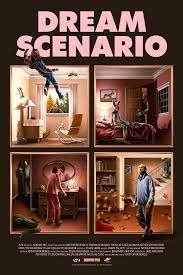
DREAM SCENARIO
US, 2023, 102 minutes, Colour.
Nicolas Cage, Julianne Nicholson, all The Lily Bird, Jessica Clement, Michael Cera, Tim Meadows, Dylan Baker.
Directed by Kristoffer Borgli.
Dream scenario
Social Media scenario
Celebrity scenario
Fame never asked for scenario
Trauma scenario
Paranoia conspiracy
Conspiracy Theory scenario
Reputation scenario
Persecution scenario
Lynching scenario
Faustian pact scenario
Collective Unconscious scenario
Mediocrity scenario
Inceptionistic scenario
Capitalistic exploitation scenario
Notoriety scenario
All of the above, dramatised quite strikingly by Swedish writer-director, Kristoffer Borgli (Worst Person in the World, Skin I’m In). This film is clever, initially humorous, deadly serious (often literally), satirical, moralising, and allegory of how we live in the social media age of the 21st-century and where it might lead us.
Praise to Nicholas Cage for his different performance, although for 40 years he has shown a great variety of talent, even if in more recent times he has opted for slam bang action shows. Here he is a quiet Prof at a small university, teaching evolutionary biology, two teenage daughters, with their problems, and are taken for granted wife, Julianne Nicholson.
Promotion of the film means that most of us know that he starts appearing in other people’s dreams, much to his surprise, feeling very uncomfortable, then discovering comfort in being something of a celebrity. But, this is the social media age, this is a paranoia here are, we live in a world of conspiracy theories – and the quiet Professor becomes a nightmare aggressor, real-life target and victim.
The narrative doesn’t go entirely in the way that is predictable. Rather, it dramatises all the scenarios mentioned above, the Prof’s life changed, his dream of a book on biology transformed into a sensationalised pop-seller on the celebrity of notoriety.
Dreams have always been popular staple of cinema. Nightmares is well – and the Prof is likened to Freddy Krueger, slasher she is attached for a photo shoot. And, just as we might have been distracting ourselves from the paranoid shenanigans, wondering about the Collective Unconscious and what card you might have made of Dream Scenario, he does get a mention. Which means that the drama is a clever play on the Collective Unconscious, at its worst.
And, Inception? Layers of dreams, people entering the different layers, dream shaping the characters – and, while it is treated as something of a hoot, part of the climax of capturing Scenario is an enterprising youngster creating a means for anyone to attach a product to their wrists and wish themselves into other people’s dreams.
A lot to interest, a lot to entertain, a lot to question – in the hope that the film has a dream run!
- The title? Dreams? Tradition of dreams in films? Reality? Fantasy? Happy dreams? Not nightmares? Real characters in dreams?
- References to the Collective Unconscious, Carl Jung? A sinister interpretation of the Collective Unconscious?
- The use of the word scenario? The range of scenarios throughout the film, dreams, celebrity, nightmares, persecution, a Faustian pact with commercialism, fame and failure?
- The Swedish director, perspective, right, humour?
- Nicolas Cage, a different performance, more restrained? His appearance, bald, the beard? Quietly spoken, academic? Problems with the two daughters? Taken for granted support of his wife? The lectures, evolutionary biology, the students talking, is using the metaphor? His friendship with the Dean? An ordinary life?
- The initial dreams, his daughters, friends, his presence, passing by, situations, not intervening?
- The various encounters, people recognising him at restaurants, in the street? The huge number of people dreaming? The lecture, the crowds, the various stories? His becoming famous, throughout the world, social media, celebrity, the interviews, his wanting to write his biology book? The company, “Thoughts Thoughts”, the young Chairman, the talent scouts, the meeting, the commercial talk and jargon, Paul misunderstanding?
- The change in tone, his aggression in dreams, fears, students not coming, frightened? The Freddy Krueger references? His becoming a hate figure?
- The consequences at home, his wife and the celebrity, initial wariness, support, the daughters and their reactions?
- Conspiracy theories, messages online, his becoming a hate-figure? The incident in the diner, hostile response, spitting in his meal? People in the street? His daughters and school, the authorities and not wanting him present, at the performance, his going, wanting to get in, the struggle with the teacher, the violence, the accident, everybody turning on him?
- Separation from his wife, going to Paris, the Thoughts Thoughts Chairman, the book launch, in the basement, the pop book on his being a nightmare?
- The young inventor, the brace on the arm, being able to enter other people’s dreams? A variation on Inception?
- A variation on: What does it profit to gain the whole world and lose one’s soul?